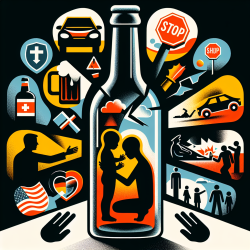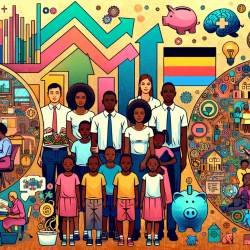The Hidden Harms of Alcohol: A Call to Action for Practitioners
Alcohol consumption is often discussed in terms of its direct impact on the drinker, but the ripple effects on others can be equally devastating. A recent study titled "Quantifying harms to others due to alcohol consumption in Germany: a register-based study" sheds light on the significant health harms caused to third parties by alcohol consumption in Germany. This blog aims to explore these findings and discuss how practitioners can leverage this data to improve outcomes for affected individuals, particularly children.
Understanding the Scope of Alcohol-Related Harms
The study provides a comprehensive analysis of the incidence of fetal alcohol syndrome (FAS) and fetal alcohol spectrum disorders (FASD) among newborns, as well as alcohol-attributable road traffic fatalities and interpersonal violence-related deaths. The findings are alarming:
- FAS and FASD incidences were estimated at 41 and 177 children per 10,000 live births, respectively.
- Alcohol was responsible for 1,214 third-party road traffic fatalities, accounting for 45.1% of all such fatalities.
- 55 deaths from interpersonal violence were attributed to alcohol, representing 14.9% of all interpersonal violence deaths.
Implications for Practitioners
These findings underscore the urgent need for practitioners to adopt data-driven approaches in addressing the harms caused by alcohol consumption. Here are some actionable steps:
- Screening and Intervention: Implement routine alcohol use screenings for pregnant women and individuals involved in road traffic accidents or violence-related incidents. Early intervention can prevent further harm.
- Education and Awareness: Educate patients and their families about the risks of alcohol consumption, particularly during pregnancy, to prevent FAS and FASD.
- Collaboration with Policy Makers: Work with local authorities to advocate for stricter alcohol policies and enforcement measures, such as roadside breath testing and public awareness campaigns.
Encouraging Further Research
While this study provides valuable insights, there is a need for more comprehensive research to fully understand the extent of alcohol-related harms. Practitioners are encouraged to participate in or support studies that explore the broader social and health impacts of alcohol consumption.
Conclusion
The study's findings highlight the significant harm alcohol consumption can inflict on third parties, particularly children. By integrating these insights into practice, practitioners can play a crucial role in mitigating these harms and improving outcomes for affected individuals.
To read the original research paper, please follow this link: Quantifying harms to others due to alcohol consumption in Germany: a register-based study.










